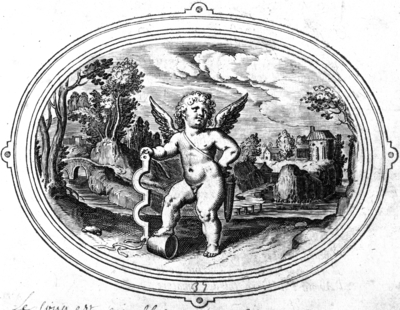Gratum amanti iugum [37]

For freedome seruitude.
The cap of libertie1 loue vnder foot doth tread,
And holdeth fast the yoke of thraldome seeming sweet,
The name of beeing free is to no louer meet,
For loue him freely doth to willing bondage lead.
And holdeth fast the yoke of thraldome seeming sweet,
The name of beeing free is to no louer meet,
For loue him freely doth to willing bondage lead.
Translations
 |
Een minnaar vindt het juk aangenaam. |
 |
A lover loves the yoke. |
 |
Tibullus, Elegiae 2, 4, 1-2
Zo wacht mij nu de slavernij, een vrouw zal mij bevelen; ik werd geboren als vrij man, maar dat is nu voorbij.
[tr. J. Nagelkerken, Baarn 1994, p. 60.]. |
 |
Tibullus, Elegiae 2, 4, 1-2
Here I see slavery and my mistress waiting for me. Now fare well, ancient freedom of my fathers. |
 |
Propertius, Elegiae 2, 23, 23-24
Vrijheid blijft - waar of niet? - voor alle minnaars illusie: maar wie geen meisje versiert, is die dan werkelijk vrij?
[tr. W.A.M. Peters, Baarn 1991, p. 69.]. |
 |
Propertius, Elegiae 2, 23, 23-24
Since no lover has any freedom left, no man who would be free will seek to love. |
Literature
- Sebastiàn, Lectura crítica
 , p. 27
, p. 27
Sources and parallels
- Supplied motto for: Nullus liber erit, si quis amare volet [40] (in: Otto Vaenius, Amoris divini emblemata (1615))
[Compare
![Compare [compare]](/static/images/compare2.gif) ]
]
-
Same metaphor used in: Captis oculis, capitur bellua. [10] (in: Jacob Cats, Sinne- en minnebeelden (1627))
[Compare
![Compare [compare]](/static/images/compare2.gif) ]
]
-
Parallel for the pictura (mirrored) and the Latin motto in: Un Cupidon tenant le pied sur un Chapeau de liberté (in: Daniel de la Feuille, Devises et emblemes (1691))
[Compare
![Compare [compare]](/static/images/compare2.gif) ]
]
-
Choice between Christ's yoke and the wordly life leading to death, in: Rectum judicium [4] (in: Georgette de Montenay/Anna Roemer Visscher, Cent emblemes chrestiens (c. 1615))
[Compare
![Compare [compare]](/static/images/compare2.gif) ]
]
-
Choice between Christ's yoke and the wordly life leading to death, in: Rectum judicium [4] (in: Georgette de Montenay/Anna Roemer Visscher, Cent emblemes chrestiens (c. 1615))
[Compare
![Compare [compare]](/static/images/compare2.gif) ]
]
References, across this site, to this page:
- Rectum judicium [4] (in: Georgette de Montenay/Anna Roemer Visscher, Cent emblemes chrestiens (c. 1615))
- Rectum judicium [4] (in: Georgette de Montenay/Anna Roemer Visscher, Cent emblemes chrestiens (c. 1615))
- Captis oculis, capitur bellua. [10] (in: Jacob Cats, Sinne- en minnebeelden (1627))
- Un Cupidon tenant le pied sur un Chapeau de liberté (in: Daniel de la Feuille, Devises et emblemes (1691))
- Nullus liber erit, si quis amare volet [40] (in: Otto Vaenius, Amoris divini emblemata (1615))
Iconclass
A cupid resting his hand on a yoke and his foot on freedom's cap- trees
[25G3]

- river
[25H213]

- farm or solitary house in landscape
[25I3]

- landscape with bridge, viaduct or aqueduct
[25I6]

- trampling, treading, stamping on someone or something
[31A2726]

- head-gear (with NAME)
[41D221(CAP)]

- quiver
[45C23]

- yoke
[46C14111]

- Freedom, Liberty; 'Liberté' (Ripa) (+ symbolical representation of concept)
[51E11(+3)]

- Freedom, Liberty; 'Liberté' (Ripa) (+ emblematical representation of concept)
[51E11(+4)]

- Curtailment (+ emblematical representation of concept)
[51EE12(+4)]

- Servility (+ symbolical representation of concept)
[53CC12(+3)]

- Pleasure, Enjoyment, Joy; 'Allegrezza', 'Allegrezza da le medaglie', 'Allegrezza, letitia e giubilo', 'Diletto', 'Piacere',
'Piacere honesto' (Ripa) (+ emblematical representation of concept)
[56B1(+4):56F2(+4)]

- proverbs, sayings, etc. (with TEXT)
[86(GRATUM AMANTI IUGUM)]

- specific aspects of Cupid
[92D17]

- attributes of Cupid (with NAME)
[92D18(QUIVER)]

Comments
Notes
The Phrygian cap was worn during the Roman Empire by former slaves who had been emancipated by their master and whose descendants
were therefore considered citizens of the Empire. This usage is often considered the root of its meaning as a symbol of liberty.
From Wikipedia: 'Phrygian cap'
![[H O M E : Emblem Project Utrecht]](/static/images/rd-small.gif)


















































































































































